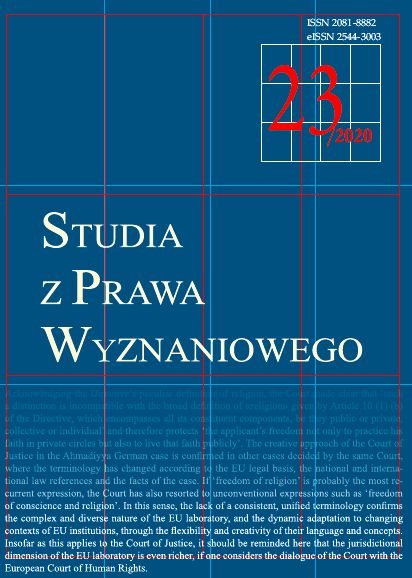Ograniczenia zdolności prawnej osób duchownych w pracach kodyfikacyjnych doby Królestwa Kongresowego
Limitations of the legal capacity of the clergy in the codification work during the era of the Congress Kingdom of Poland
Author(s): Piotr Zbigniew PomianowskiSubject(s): Law, Constitution, Jurisprudence, History of Law, Constitutional Law, Civil Law, Human Rights and Humanitarian Law, Canon Law / Church Law
Published by: Katolicki Uniwersytet Lubelski Jana Pawła II - Wydział Prawa, Prawa Kanonicznego i Administracji
Keywords: legal capacity; clergy; Kingdom of Poland; Napoleonic Code; zdolność cywilna; osoby duchowne; Królestwo Kongresowe; Królestwo Polskie; Kodeks Napoleona; duchowni;
Summary/Abstract: The article focuses on the limitations of the legal capacity of the clergy in the codification work during the era of the Congress Kingdom of Poland. According to canon law, which was largely respected by the courts of the Polish-Lithuanian Commonwealth, the rights of monks and nuns were severely limited in matters related to succession (in particular, as far as inheritance or wills are concerned). Moreover, in light of the fully religious nature of marriage law, persons obliged to celibacy could not, as a matter of course, enter into a marital relationship. Austrian and Prussian lawmakers respected many of the ecclesiastical rules which regulated the status of the clergy. On the other hand, the Napoleonic Code did not place any limitations on the clergy in the realm of inheritance or marriage law. In 1807, the Duchy of Warsaw was established from the Polish lands seized by Prussia where Landrecht of 1794 was in force. In 1809, some lands occupied by Austria were incorporated into the Duchy of Warsaw. The civil code of Western Galicia (a precursor of Allgemeines Bürgerliches Gesetzbuch) was binding within these territories. Soon afterwards, the Napoleonic Code was introduced into both parts of the Duchy. During the Congress of Vienna it was decided that a major part of the Duchy would be transformed into the Kingdom of Poland under Russian control. It was obvious that Emperor Alexander I would reform the secular Napoleonic law of the Kingdom of Poland. While the prohibition of concluding marriages by the Catholic clergy was not questioned, the scope of potential limitations of the legal capacity of monks and nuns was the subject of much debate. The members of the Codification Commission could not come to an agreement whether to change or preserve the French regulations. Finally, Alexander I ordered to introduce them into the Civil Code of the Kingdom of Poland. The article gives a fresh view on the debate as it is based on the analysis of recently discovered materials from one of the Moscow archives.
Journal: Studia z Prawa Wyznaniowego
- Issue Year: 2020
- Issue No: 23
- Page Range: 263-276
- Page Count: 14
- Language: Polish

